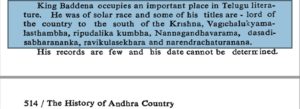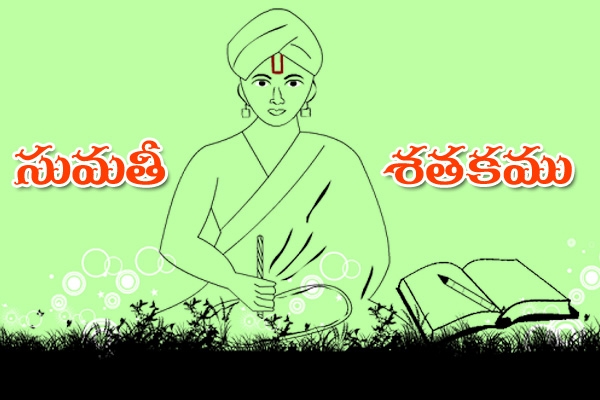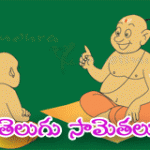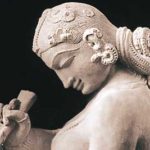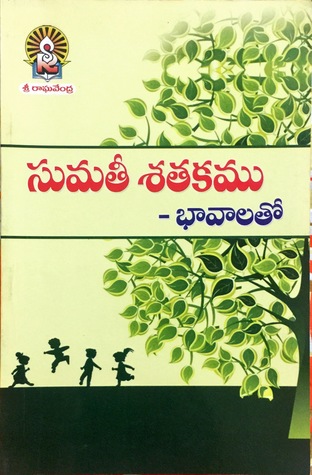
Sumathi Satakam, or as we say in acchu Telugu, Sumathi Sathakamu, is a Telugu classic.
A Sathakam is a Sanskrit poetic form consisting of 100 verses. Each verse is makes up 1 thematic unit. There is a common refrain for all verses, and can be either a sentence or even a word. The latter is the case with the Sumathi Satakam.
Sumathi means ‘benevolent one’ or ‘one with good intent’. But while much is lucid about the literary composition, the composer of this work is somewhat obscured by the mists of time.
Author
There has been some recent discrepancy as to the origin of Baddena. Due to the incorrigible caste competition in AP, he has been claimed by many groups. However, as per multiple authorities, he was quite clearly a Telugu Chola, and therefore, of Kshatriya background. As per P. Ragunadha Rao:
“The immensely popular works Sumati Satakam is attributed to Baddena, a Telugu Choda king of the Kakatiya period. His other work is Niti Sastra Muktavali. ” [1, 80]
Per Chenchaiah Bhujanga:
“Baddena, otherwise known as Bhadrabhupala, one of the feudatories of Ganapathi Deva authored the Niti sastra muktavali and the famous Sumati Satakam.” [2, Xv]
Yashoda Devi also elaborates upon this, in her work History of the Andhra Country:
This would very much align with Nannechoda (another Telugu Chola) as his literary predecessor. Not much is known about Baddena, but he was a great scholar with excellent knowledge of Sanskrit literature.
Therefore, Baddena was a Suryavanshi Telugu Chola prince who is generally considered to have been a feudatory of Ganapathi Deva or Rudrama Devi. He was a Raama bhakta (as seen in the invocation of the Sathakam), and is said to have lived in Kadapa district in Baddenavolu (Badvel), in Raayalaseema. Niti Sukti Muktavali is considered his first work. . [5, 6]
“Baddena is impartial in teaching morals to the low level civil servants and to the kings; he does not mince words in criticizing any official; he is out-spoken in his description of the temperaments and motivations of people in various professions. His commitment to truth and fairness stands out in his verses.” [5, 6]
“Baddena seems to have enjoyed the good things of life, like chewing the betel – quite common in those days – a refreshing head bath, and reunion with wife after a tiff. Weddings were celebrated with music and good food.”[5, 7]
Baddena was considered a keen observer of life in general, and people in particular. He was committed to the truth, and thus, was searing in his criticism of them and generous in love, nonetheless. Like all teachers of Nitisastra, he is practical yet principled. He writes “A man with high moral values is stronger (better) than a physically strong man, just as a mahout is more powerful than an elephant.” [5, 7]
Composition
Given that it dates to the Kakatiya era, the archaic literary Telugu that is used (Praacheena Telugu) naturally may seem vastly different to us today. And yet, every once in a while is a line that reads almost like modern (Aadhunika) Telugu. It, therefore, makes an interesting read purely on those grounds, as we see the evolution of our beloved bhaasha from medieval times to the modern.
“Baddena emphasized the need for good personal and family relationships, which ensure happiness for all. He gave high place to women in the family structure. He announces that for one’s prosperity it is the lady of the house that is the true source. He also cautions male folk against making women weep, as Lakshmi will not dwell in the house where women are unhappy.” [5, 7]
And yet, like many great poets and scholars of worth, Baddena shows the dichotomous view that most men who celebrated women tended to have. On the one hand he exhorts men to honour women and treat them well, and yet, on the other, he remains suspicious of their professions of love. He writes that the promises of a woman are like the promises of a ruler, and that both are fickle.
The beauty of his Sumathi Sathakamu is that it is:
- Both Moral and Practical
- Advises for both Happiness and Success
- Encourages neither aescetism nor hedonism, but balance
- Uses simple language accessible to all
- Utilises upama (simile) to convey morality. Truly the mark of an effective work.
Some of Baddena’s Niti is rather archaic in view, some it shows the antiquated caste views of the time, but much of it remains practical, and like all Nitisaastra, is relevant in every time. Some may criticise Baddena for his suspicions of women. Indeed, given that we are the civilization of Seetha, Savithri, and Arundhathi, it may in fact seem unfair. But just as every woman has fears about men, every man has fears about women!
Just as there are good men and bad men, there are good women and bad women, and Baddena is only giving voice to his experience and the fears all men have. Why should they give away what they have, why should they trust? In our era, both genders have these questions, which, given what we see all around us, is only natural.
Baddena may have encountered mostly characterless women (his rather well-informed views on courtesans seem to indicate this), and predictably became sour. Let his lamentations on romance be more of a lesson on the importance of character…in both women and men…and take what lessons one can get from it. Women can understand the male perspective and be sensitive to it, and men can learn the value of a good woman instead of being distracted by merely a beautiful one.
Sumathi Sathakamu has 110 verses. It is over 800 years old. It is composed in kandamu metre. This chanda is considered a test of a kavi’s skill, and a showcase of his mastery of kaavyasaastra or Classical Indic Literary Theory. Sumathi means “person of good sense”, and the poem is addressed to this person, whose identity we do not know. A work of Nitisaastra, it exhorts good conduct in all walks of life and yet, true to Niti, also is practical, and gives advice for success. [5, 5]
Selections
[4]
§
శ్రీరాముని దయ చేతను
నారూడిగ సకల జనులునౌరా యనగ
ధారాళ మైన నీతులు
నొరూరగ జవులు పుట్ట నుడివెద సుమతి!
Sriraamuni dhaya che’thanu
naaroodiga sakala janulu nauraa yanaga
dhaaraala maina neethulu
norooraga javulu putta nudivedha Sumathi! sl.1
Sumati, with the grace of Sri Rama, I shall tell plenty of morals. All the people will certainly be fascinated
and will ask for more.
[Explanation:] The poet states his theme of morals, which will be of interest to everybody. In this noble task he seeks the blessings of Sri Rama. [5,9]
§
ఊపమింప మొదట తీయ్యన
కపటం బెడనెడను జీరకు కైవడినె పొ
నెపములు వెదకును గడపట
గపటపు దుర్జాతి పొండు గదరా సుమతి!
Upamimpa modatha theeyyana
kapatam bedanedanu jeeraku kaivadine po
nepamulu vedakunu gadapata
gapatapu dhurjaathi pondu gadharaa Sumathi! sl.15
Sumati, friendship with wicked persons is like sugarcane: it is sweet in the beginning and turns tasteless in the end.
Initially it entices and then becomes deceitful finding faults.
[Explanation:] This is a worthwhile caution against trusting deceitful persons who befriend you talking sweetly, but finally quarrel with you. [5, 15]
§
ఏప్పటి కెయ్యది ప్రస్తుత
మప్పటికా మాటలాడి యన్యుల మనముల్
నొప్పింపక తా నొవ్వక
తప్పించుక తిరుగువాడు ధన్యుడు సుమతి!
Eppati keyyadi prasthutha
mappatikaa maatalaadi yanyula manamul
noppimpaka thaa novvaka
thappinchuka thiruguvaadu dhanyudu Sumathi!
Sumati, a person, who speaks whatever is appropriate at the given time and so doesn’t hurt others’ feelings,
or get his own feelings hurt, is fortunate.
[Explanation:] Whenever we interact with a person we have to consider the occasion, the time and that person’s frame of mind. We should not hurt him, nor should we get hurt ourselves. s.16 [5, 15]
§
[4]
కారణము లేని నగవును
బెరణము లేని లేమ ఫృధివి స్థలిలొ
బూరనము లేని బూరెయు
విరణము లేని పెండ్లి వృదార సుమతి!
Kaaranamu leyni nagavunu
beranamu leyni leyma prudhivi sthalilo
booranamu leyni booreyu
viranamu leyni pendli vrudhaara Sumathi! sl.33
Sumati, on this earth, laughing without reason, a woman without a blouse, a sweet dish without the
stuffing inside, a wedding without a double drum, are all wasteful.
[Explanation:] The value of certain things can be enhanced if they are properly presented. Just as a dish without the sweet stuffing will be insipid, many other things will fail to impress without proper embellishments. [5, 22]
§
డగ్గర కొండెము చెప్పెడు
ప్రెగ్గడ పలుకులకు రాజు ప్రియుడై మరి త
నెగ్గు ప్రజ కాచరించుట
బొగ్గులకై కల్పతరువు బొడుచుట సుమతి!
Daggara kondemu cheppedu
preggada palukulaku raaju priyudai mari tha
neggu praja kaacharinchutha
boggulakai kalpatharuvu boduchutha Sumathi! sl.42
Sumati, a king who listens to his minister’s complaints against his people and harms them is like axing
a wish-granting tree for the sake of charcoal.
[Explanation:] A ruler is usually surrounded by clever tale – bearers. A wise ruler will not encourage them. He will come to his own judgment and will not be swayed by the tales borne by selfish persons. [5, 26]
§
చేతులకు తొడవు దానము
భూతల నాథులకు దొడవు బొంకమి, ధరలొ
నీతియ తొడవెవ్వారికి
నాటికి మానంబు తొడవు, నయముగ సుమతి
Che’thulaku thodavu dhaanamu
bhoothala naathulaku dhodavu bonkami, dharalo
neethiya todavevvaariki
naatiki maanambu thodavu, nayamuga Sumathi! sl.44
Sumati, in this world, giving away liberally is an ornament for the hands.
Not uttering falsehoods is an adornment for the kings. Morality is an adornment to all.
For women, honor is the adornment.
A person may wear gold rings or other ornaments on his hands, but it is his willingness to give that is
his real adornment.
[Explanation:] A king may wear gold and diamond ornaments from head to foot, but his real
distinguishing mark is his truthfulness.
More than anything else, honor is the most important
embellishment for a woman.
Qualities of head and heart are more important than monetary or material acquisitions. [5, 26]
§
కాదని యెవ్వారి తోడన్
వాదించక చూడ వెర్రి వానింబలెనే
భేదాభేదము దెలిపెడు
వేదాంత రహస్యమెల్ల వెదుకర సుమతి!
Kaadhani yevvaari tho’dan
Vaadinchaka chooda verri vaanimbaleney
Bhe’dhaabhe’dhamu dhelipedu
Vedaanta rahasyamella vedukara Sumathi! sl.53
One should not argue with any body, disagreeing with him. It is wisdom to appear like a dull-witted person
and seek the hidden secrets of Vedanta (a branch of Hindu philosophy), which advises one on the
differences and non-differences among human beings.
[Explanation:] In the world, those, who show off as highly intelligent, pick up arguments with all and sundry.
That is the sure way to lose friends. But if we appear like less brilliant people and patiently study the others
and discover the differences among them, we are likely to be successful. [5, 30]
§
తల మాసిన నొలు మాసిన
వలువలు మాసినను ప్రాణ వల్లభు దైనన్
గులకాంతలైన రోతురు
తిలకింపగ భూమిలోన దిరముగ సుమతి!
Thala maasina nolu maasina
valuvalu maasinanu praana vallabhu dhainan
gulakaanthalaina ro’thuru
thilakimpaga bhoomilo’na dhiramuga Sumathi! sl.54
Sumati, in this world, even if a man is dearer to a woman than her life, she will loathe him if his hair is
untidy, if his body is dirty, or his clothes soiled.
It is necessary to maintain personal cleanliness for our own health and for social and even domestic
acceptability. [5, 30]
§
వినదగు నెవ్వరు చెప్పిన
వినినంతనె వేగపడక వివరింపదగున్
గని కల్ల నిజము తెలిసిన
మనుజుడే పో నీతిపరుడు మహిలొ సుమతి!
Vinadhagu nevvaru cheppina
vininanthane ve’gapadaka vivarimpadhagun
gani kalla nijamu thelisina
manujude po’ neethiparudu mahilo Sumathi! sl.99
Sumati, in this world, we should listen to whatever anyone says. But we should not jump to conclusions at once.
We have to judge what is false and what is true.
[Explanation:] A man who can distinguish between truth and falsehood is a virtuous person.
We should get inputs from whatever sources we can and then sift the true from the false. Then we can make our judgments. [5, 48]
§
తన కోపమే తన శతృవు తన శాంతమె తనకు రక్ష దయ చుట్టంబౌ తన సంతొషమె స్వర్గము
తన దు:ఖమె నరక మంద్రు తథ్యము సుమతి!
Thana kopame thana sathruvu
thana saanthame thanaku raksha dhaya chuttambau thana santosame svargamu
thana duhkhame naraka mandhru thathyamu Sumathi! sl.46
Sumati, your anger is your enemy; your calmness is your defence; your compassion is your relative;
your happiness is your heaven; your sorrow is your hell; this is true.
[Explanation:] Happiness and unhappiness are two attitudes in our mind. It is only our thinking which makes the difference.
Peace and happiness are possible with self – control. [5, 27]
§
References:
- Rao, P.R. History and Culture of Andhra Pradesh. New Delhi: Sterling. 1994
- Bhujangah, Chenchaiah. A History of Telugu Literature. Calcutta: Association Press. 1928
- Sumati Satakam Versions. Adyar Library. http://www.gutenberg-e.org/kam01/adyar_sumati.html
- Sumati Satakam Transcriptions. http://www.gutenberg-e.org/kam01/3404_sumati.html
- Rao, E. Nageswara. Baddena’s Sumati Satakamu. The Alpha Foundation. 2008 http://www.learningtelugu.org/files/Sumati%20Satakamu.pdf
- Sumati Satakam Blog. http://sumatisatakamyb.blogspot.com/2006/06/sumati-satakam-english-translation.html
- Devi, Yashoda. History of the Andhra Country 1000-1500 A.D. Delhi: Gyan Publishing. 1993

